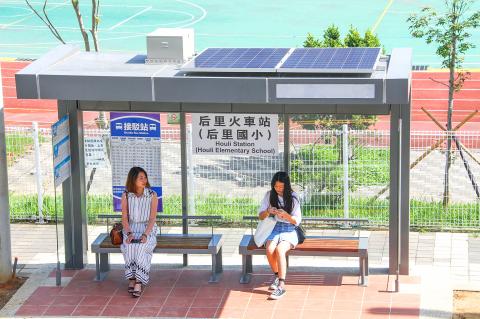Taichung expects to save 300,000 kilowatt-hours (kWh), or NT$1.05 million (US$35,916) in electricity fees, per year, after completing 210 new bus stops that have solar panels and sport new lighting systems, furthering the municipal goals for green transport, Taichung Transportation Bureau Director-General Wang Yi-chuan (王義川) said on Friday.
The bus stops that the former Taichung County built were too simple and many lacked lighting, Wang said, adding that the municipal government built the new stops at a cost of NT$80,000 per stop.
The old bus stops consumed 1,429kWh per year, costing the municipality NT$5,000, Wang said.

Photo: Huang Chung-shan, Taipei Times
The solar panels on the new bus stops generate electricity for lighting and could save about 755kg of carbon dioxide equivalent emissions per stop, as well as lowering the electricity bill, Wang said.
The Taichung City Government gave priority to rural areas in replacing bus stops, not only saving 160 tonnes of carbon dioxide equivalent, but also making passengers waiting for buses late at night feel safer because of the better lighting, Wang said.
A lack of lighting in the past forced passengers to step outside bus stops to flag buses down, the department said, adding that passengers could now safely wait under the cover of the bus stops.
The new bus stops are bright, safe and environmentally friendly, and they change the image of the city, a student surnamed Ko (柯) said, urging the municipality to build more.
Taichung is uniquely positioned to develop renewable sources of energy, the city government said, adding that with the new stops, it now boasts the greatest number of solar-powered bus stops in the nation.
New Taipei City and Tainan each has more than 10, but less than 20, Kaohsiung has 30 and Taipei has fewer than that, the city said.
Depending on the efficiency of the solar panels, the municipal government is considering installing additional LED displays with information on the buses’ whereabouts, the municipality said.

An essay competition jointly organized by a local writing society and a publisher affiliated with the Chinese Communist Party (CCP) might have contravened the Act Governing Relations Between the People of the Taiwan Area and the Mainland Area (臺灣地區與大陸地區人民關係條例), the Mainland Affairs Council (MAC) said on Thursday. “In this case, the partner organization is clearly an agency under the CCP’s Fujian Provincial Committee,” MAC Deputy Minister and spokesperson Liang Wen-chieh (梁文傑) said at a news briefing in Taipei. “It also involves bringing Taiwanese students to China with all-expenses-paid arrangements to attend award ceremonies and camps,” Liang said. Those two “characteristics” are typically sufficient

A magnitude 5.9 earthquake that struck about 33km off the coast of Hualien City was the "main shock" in a series of quakes in the area, with aftershocks expected over the next three days, the Central Weather Administration (CWA) said yesterday. Prior to the magnitude 5.9 quake shaking most of Taiwan at 6:53pm yesterday, six other earthquakes stronger than a magnitude of 4, starting with a magnitude 5.5 quake at 6:09pm, occurred in the area. CWA Seismological Center Director Wu Chien-fu (吳健富) confirmed that the quakes were all part of the same series and that the magnitude 5.5 temblor was

The brilliant blue waters, thick foliage and bucolic atmosphere on this seemingly idyllic archipelago deep in the Pacific Ocean belie the key role it now plays in a titanic geopolitical struggle. Palau is again on the front line as China, and the US and its allies prepare their forces in an intensifying contest for control over the Asia-Pacific region. The democratic nation of just 17,000 people hosts US-controlled airstrips and soon-to-be-completed radar installations that the US military describes as “critical” to monitoring vast swathes of water and airspace. It is also a key piece of the second island chain, a string of

The Central Weather Administration has issued a heat alert for southeastern Taiwan, warning of temperatures as high as 36°C today, while alerting some coastal areas of strong winds later in the day. Kaohsiung’s Neimen District (內門) and Pingtung County’s Neipu Township (內埔) are under an orange heat alert, which warns of temperatures as high as 36°C for three consecutive days, the CWA said, citing southwest winds. The heat would also extend to Tainan’s Nansi (楠西) and Yujing (玉井) districts, as well as Pingtung’s Gaoshu (高樹), Yanpu (鹽埔) and Majia (瑪家) townships, it said, forecasting highs of up to 36°C in those areas